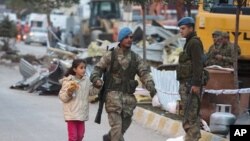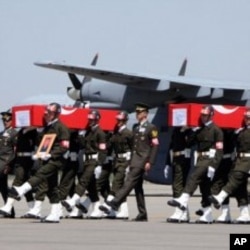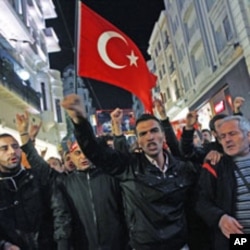Sunday's powerful 7.2 magnitude earthquake in Turkey's predominantly Kurdish southeast has put the spotlight on relations between Turks and Kurds.
Tragedy and grief
The quake happened a few days after the killing of 24 Turkish soldiers by the Kurdish rebel group, the PKK. The response to the quake, which killed more than 500 people, injured at least 1,600 and left thousands homeless, has seen both a humanitarian outpouring of support but also ugly nationalism by some Turks toward the survivors.
At the same time the predominantly Kurdish region around the city of Van was being devastated by an earthquake, Turks were demonstrating across the country against the recent killing of 24 Turkish soldiers by the Kurdistan Workers Party, or PKK, in an outpouring of grief and fury.
Muge Anil controversy
But even as the magnitude of the disaster became clear, with rescue workers battling to save those trapped and tens of thousands of people left destitute, well-known television presenter Muge Anil provoked a storm of controversy by questioning why Turks should help Kurds who are in desperate need in the earthquake area.
She said people should know their place. She said first the Kurds throw stones at Turkish police and kill Turkish soldiers, but when they are in trouble, she said they call the Turkish army and police for help.
After a storm of protests, Anil was forced to apologize. But political columnist Asla Aydintasba, of the Turkish newspaper Milliyet, says Anil's mistake was to say on televison what many Turks are feeling.
"Coming right after the PKK attack here, when 24 people died, there is a certain amount [of] racism, in some quarters, we see this in social media," said Aydintasba. "People saying that we are not going to grieve for the earthquake because the people who died did not grieve for the loss of [the] lives of Turkish soldiers. Getting into a cab and start talking to the cab driver, start talking to random people, this resentment towards Kurds does exist. It does signal a deep current underneath which [we] need to really focus on."
Help vs. hate
But other Turks have reached out to the quake-stricken area. On Wednesday, TV stations ran a nationwide appeal called "One Heart," raising millions of euros. Calls for warm clothing also have been met with a strong response. But organizers are reporting that they are finding obscene notes condemning Kurds in the pockets of some of the donated clothes. It is such a problem that all items are being searched.
Concern about such ethnic hatred prompted Turkish Prime Minister Recep Tayyip Erdogan to angrily condemn it.
He said each word, each phrase, each expression towards discrimination is inhuman, unconscionable. He said he is seeing all this as sickening and that it is enough.
Ethnic polarization
The prime minister should be concerned, according to retired Brigadier General Haldun Solmazturk, who spent much of his career fighting the PKK. He says the past few months have seen an upsurge in fighting, claiming the lives of more than 50 Turkish soldiers. He says this is fueling a deepening and worrying ethnic polarization.
"There has been a rapidly growing reaction to the events in southeastern Turkey, especially these ambushes," he said. "And people are looking for [an] answer, which is not being answered - neither by the politicians and bureaucrats. So the tension is just building up, and this reaction is directed to the Kurdish people. At some stage, this could ignite an actual attack. I am afraid that there is potentially that once sparked, [it] could spread throughout Turkey."
Observers say the Van area earthquake is now taking on an increasingly symbolic importance - will such a tragedy unite Turkey or further polarize it?






